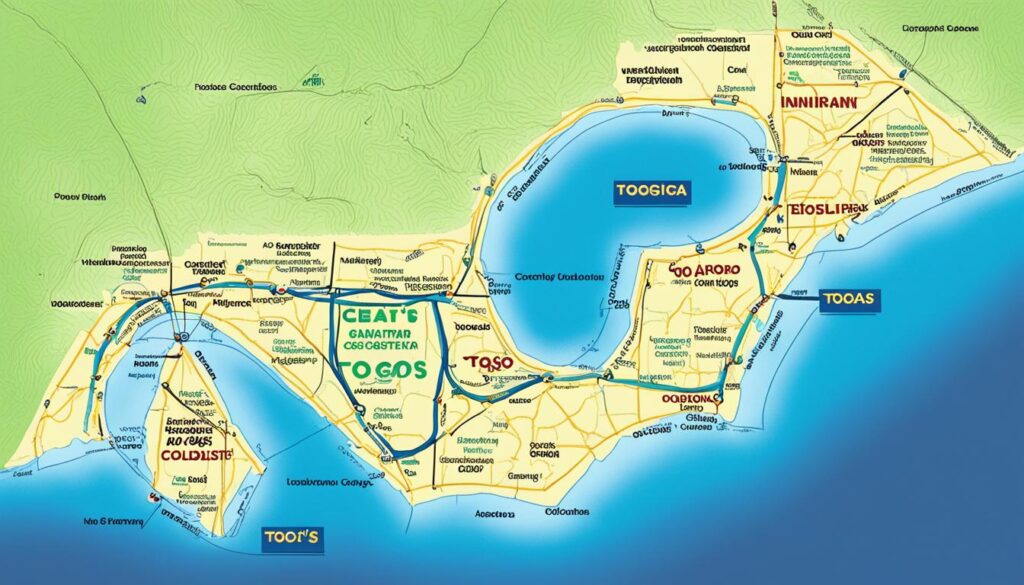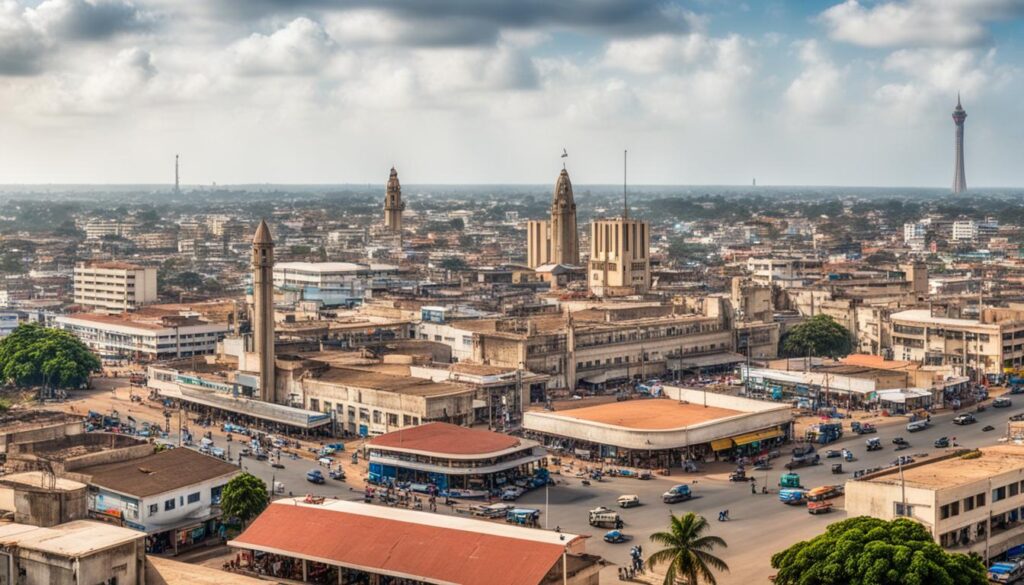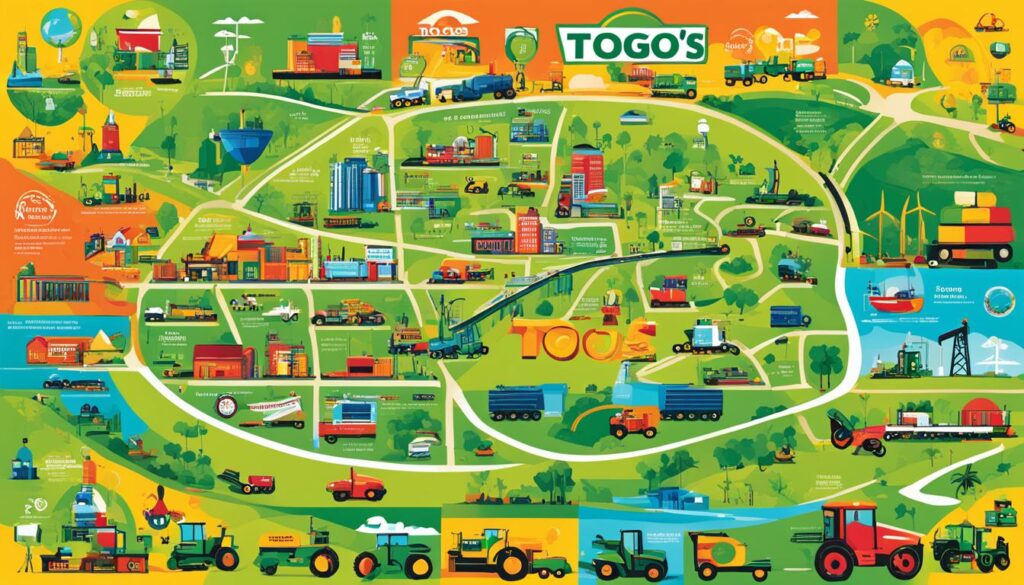Togo, a coastal nation in West Africa, is emerging as a strategic economic hub, boasting a robust growth trajectory and progressive reforms. With a population of around 8.5 million, this vibrant country is making significant strides towards sustainable development, leveraging its advantageous geographic location and burgeoning logistics capabilities. Notably, Togo holds the distinction of having the highest Human Capital Index (HCI) within the West African Economic and Monetary Union (UEMOA), a testament to its commitment to human capital investment.
Key Takeaways
- Togo, a coastal West African nation, is experiencing robust economic growth and progress in its development as a strategic logistics and trade hub.
- The country boasts the highest Human Capital Index (HCI) within the West African Economic and Monetary Union (UEMOA), reflecting its commitment to human capital investment.
- Togo’s strategic location and emerging economy offer promising opportunities for investors and businesses seeking to tap into the region’s potential.
- The government’s ongoing political and economic reforms aim to improve the ease of doing business and enhance the country’s competitiveness.
- Togo’s capital, Lomé, is a vibrant and diverse city that serves as a gateway to the country’s economic and cultural offerings.
Togo’s Strategic Location and Emerging Economy
Togo, a coastal nation in West Africa, has strategically positioned itself as a growing logistics and trade hub for the sub-region. With its prime location along the Gulf of Guinea, Togo’s Lomé port has become a vital gateway for regional and international commerce. The country’s economic growth has been robust, with an estimated 5.4% growth in 2023 and projections of 5.1% growth in 2024, driven by a concerted effort in economic development initiatives.
Coastal Nation with a Growing Logistics and Trade Hub
Togo’s strategic location on the West African coast has been a significant asset, enabling the country to emerge as a logistics and trade hub for the sub-region. The Lomé port, one of the busiest in the region, has been a crucial driver of this growth, serving as a gateway for goods and services to and from neighboring countries. The government’s investment in infrastructure and logistics has further strengthened Togo’s position as a regional logistics and trade hub.
Robust Economic Growth and Progress in Economic Development
Togo’s economy has experienced a steady upward trajectory in recent years, with robust economic growth and progress in economic development initiatives. The country’s GDP growth rate is projected to reach 5.1% in 2024, showcasing the resilience and potential of its economy. This growth has been driven by a range of factors, including the government’s focus on diversifying the economy, improving the business environment, and attracting foreign direct investment.

Political Landscape and Reforms
Togo’s political landscape has been dominated by the ruling Union pour la République (UNIR) party for years. However, the country has recently undergone significant constitutional reforms that will transition it from a semi-presidential to a parliamentary system. Under the new constitution, the President of the Republic will hold mainly ceremonial powers, while the President of the Council, the leader of the majority party in the National Assembly, will serve as the head of government.
Upcoming Legislative and Regional Elections
New legislative and regional elections are scheduled for April 2024 in Togo. These elections are expected to play a crucial role in shaping the country’s political landscape, as voters will have the opportunity to choose their representatives at both the national and local levels. The upcoming elections will be closely watched by both Togolese citizens and the international community, as they will provide insight into the public’s sentiment towards the ongoing constitutional reforms and the ruling UNIR party.

As Togo navigates these political changes, it is essential to monitor the progress of the constitutional reforms and the outcome of the upcoming elections. These events will shape the future of the country’s political landscape and have a significant impact on its economic and social development.
Economic Situation and Prospects
Togo’s economic situation has faced significant challenges in recent years, stemming from the COVID-19 pandemic and the economic fallout from Russia’s invasion of Ukraine. However, the government’s proactive response has helped stabilize economic growth amidst these global headwinds.
Stabilizing Growth Amidst Global Challenges
The Togolese government has increased public spending to support the economy and cushion the impact of these external shocks. This has contributed to Togo’s economic growth, which is expected to remain resilient despite the global economic turbulence.
Fiscal Consolidation and Emergency Program Initiatives
To ensure long-term fiscal sustainability, Togo is now initiating a program of fiscal consolidation, with the goal of reducing the budget deficit to 3% of GDP by 2025. Simultaneously, the government has implemented an emergency program to address risks of fragility in the northern Savanes region, underscoring its commitment to inclusive and balanced development across the country.

By leveraging its strategic location and diversifying its economic base, Togo is poised to capitalize on emerging opportunities and strengthen its position as a regional economic hub in West Africa.
Key Economic Sectors and Growth Drivers
Togo’s economic landscape has shown signs of resilience, with the country’s key sectors demonstrating noteworthy recovery. The mining, electricity, and manufacturing industries have been at the forefront of this positive trend, contributing significantly to Togo’s industrial activity. Additionally, the agricultural sector has witnessed favorable conditions, leading to good harvests during the 2023-2024 season and further supporting the nation’s economic growth.
Industrial Activity on the Rise
Togo’s industrial activity has rebounded, driven by the mining, electricity, and manufacturing sectors. The mining industry, in particular, has experienced a surge in productivity, extracting valuable minerals and fueling the country’s economic development. Similarly, the electricity sector has played a crucial role, ensuring a reliable power supply to support industrial operations and economic growth.
Agricultural Productivity Boosts Economic Growth
Togo’s agricultural sector has also been a key driver of the country’s economic growth. Favorable weather conditions have led to impressive harvests during the 2023-2024 season, contributing to a rise in agricultural productivity. This increase in agricultural output has been a significant factor in Togo’s overall economic progress, underscoring the importance of the sector in the country’s economic landscape.

Togo: West African Economic Development Lomé Togo
Togo’s economic projections point to a robust growth trajectory. The country is expected to maintain a steady economic expansion, with projections of 5.4% in 2023 and 5.1% in 2024. However, regional instability, financial turbulence, and climate shocks present risks that call for reforms to accelerate growth, resilience, and public debt reduction.
Projections for Economic Growth and Poverty Reduction
As Togo continues its economic development, poverty is set to decline gradually in the coming years. Experts predict a gradual reduction in poverty levels, with the rate expected to reach 36.1% by 2026, a notable improvement from the 42.4% recorded in 2023. These projections reflect Togo’s ongoing efforts to enhance economic opportunities and improve the living standards of its population.
While Togo’s economic prospects remain promising, the country must navigate a complex global landscape. Addressing regional instability, financial volatility, and climate-related challenges will be crucial in sustaining the nation’s economic growth and reducing poverty at a faster pace. Togo’s policymakers are committed to implementing strategic reforms to bolster the economy’s resilience and ensure inclusive development for all.
Lomé: A Vibrant Capital and Gateway to Togo
Lomé, the capital and largest city of Togo, is a thriving metropolitan hub that offers a captivating blend of infrastructure, amenities, and a high quality of life. This coastal city, home to over 1.5 million residents, boasts a well-developed transportation network, including an international airport and a bustling seaport that serves as a gateway to Togo and the surrounding region.
Beyond its infrastructure, Lomé is renowned for its diverse culinary scene, featuring a range of first-rate restaurants that showcase the country’s rich culinary traditions. The city’s beautiful beaches and abundant seafood options further contribute to the overall quality of life for both residents and visitors alike.
Cultural Diversity and Educational Opportunities
Togo’s cultural diversity is reflected in the vibrant tapestry of Lomé, where various ethnic groups and religious traditions coexist harmoniously. The city is home to a thriving arts and music scene, with numerous cultural festivals and events that celebrate the nation’s heritage. Additionally, Lomé offers excellent educational opportunities, with the embassy’s English Club Competition and EducationUSA program supporting English proficiency and fostering student exchanges.
Lomé’s unique blend of infrastructure, amenities, cultural diversity, and educational resources make it a truly captivating destination, offering both residents and visitors a high quality of life and a gateway to explore the richness of Togo.
Togo’s Political and Economic Reforms
Togo has undertaken significant political and economic reforms in recent years, positioning the country as an emerging economic powerhouse in West Africa. The government’s efforts to remove technical barriers to trade were recognized by an increase in the country’s trade policy score on the Millennium Challenge Corporation (MCC) scorecard, from 39 to 59 percent, qualifying Togo for participation in an MCC Threshold Program.
Economic Reforms and Ease of Doing Business Ranking
The MCC Threshold Program aims to further spur economic growth by improving the quality and affordability of information and communication technology services, as well as instituting a land registration system to facilitate investment. These reforms have contributed to Togo’s steady climb in the World Bank’s Ease of Doing Business rankings, making it an increasingly attractive destination for foreign direct investment.
Regional Integration and Trade Facilitation Efforts
Togo’s strategic location along the coast of West Africa has also led the government to prioritize regional integration and trade facilitation. The country has actively participated in various regional economic initiatives, such as the Economic Community of West African States (ECOWAS), to streamline cross-border trade and strengthen economic ties with its neighbors. These efforts have helped Togo become a regional logistics and trade hub, further bolstering its economic prospects.
Overall, Togo’s political and economic reforms, combined with its strategic location and trade facilitation initiatives, have positioned the country as an increasingly attractive investment destination and a key player in the economic development of West Africa.
Investment Opportunities and Challenges
Togo is emerging as a promising investment destination in West Africa, thanks to the government’s proactive efforts to enhance the business environment. The country has taken significant steps to attract foreign direct investment (FDI), including adopting new legislation, digitalizing services, and establishing its first special economic zone.
Togo’s Government Initiatives to Attract FDI
The Togolese government is actively working to attract more investment opportunities in Togo. They have implemented various initiatives, such as streamlining bureaucratic processes, improving infrastructure, and providing incentives for investors. These efforts aim to position Togo as a competitive and attractive destination for FDI in the region.
Addressing Obstacles and Improving Competitiveness
While Togo has made progress, the UNCTAD Investment Policy Review of Togo highlights that the country still faces challenges in areas such as infrastructure, human resources, access to markets, and financing. Addressing these obstacles is crucial to enhancing Togo’s competitiveness and drawing more investors to the country.
Togo’s strategic location, growing economy, and government’s commitment to reforms present a compelling case for investors seeking opportunities in West Africa. By addressing the remaining challenges and continuing to improve the business environment, Togo can become an increasingly attractive investment hub in the region.
Conclusion
Togo’s strategic location, robust economic growth, and ongoing political and economic reforms have positioned the country as an emerging economic hub in West Africa. The government’s commitment to improving the business environment and attracting foreign direct investment, coupled with the country’s progress in sectors like industry and agriculture, suggest promising prospects for Togo’s continued economic development and integration into the regional economy.
Despite the challenges that remain, Togo’s future looks bright. The country’s strategic coastal position, growing logistics and trade capabilities, and stabilizing economic growth amidst global uncertainties indicate that Togo is well on its way to solidifying its role as a key player in the West African economy. As the country continues to implement reforms and capitalize on its strengths, the prospects for Togo’s economic development and integration into the regional landscape appear increasingly favorable.
Togo’s journey toward a more prosperous future is a testament to the nation’s resilience and determination. With a focus on diversifying its economic base, strengthening its infrastructure, and fostering a business-friendly environment, Togo is poised to unlock its full potential and contribute significantly to the economic development of the West African region.
Source Links
- Overview – https://www.worldbank.org/en/country/togo/overview
- Lomé – State Magazine – https://statemag.state.gov/2021/04/0421pom/
- Togo plans investment reforms to drive sustainable growth – https://www.un.org/africarenewal/news/togo-plans-investment-reforms-drive-sustainable-growth


